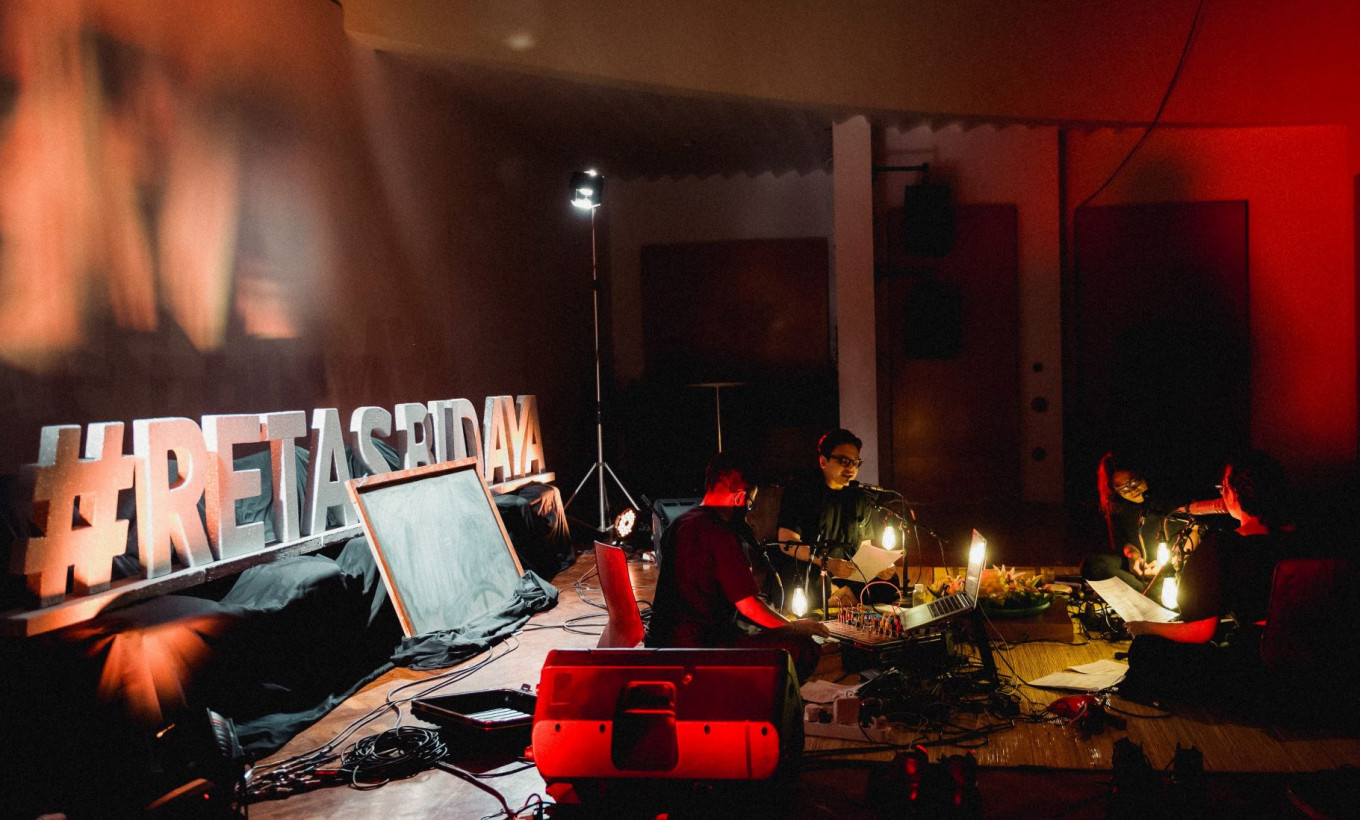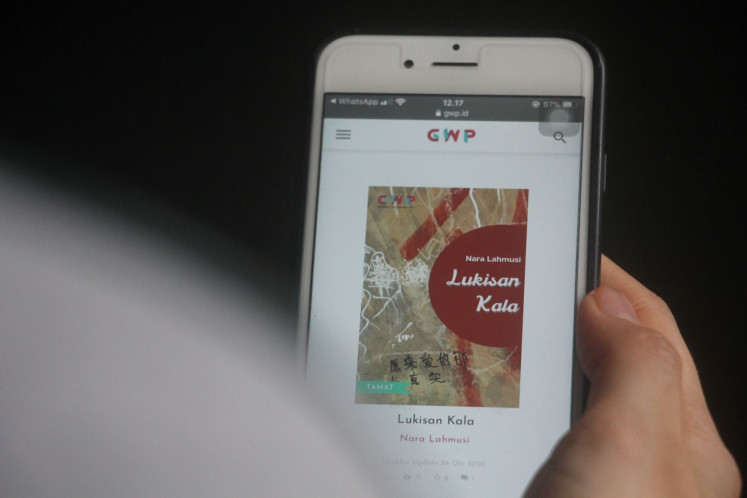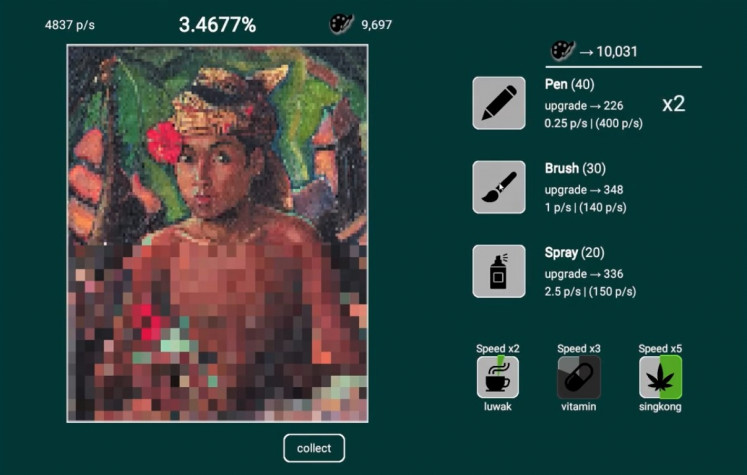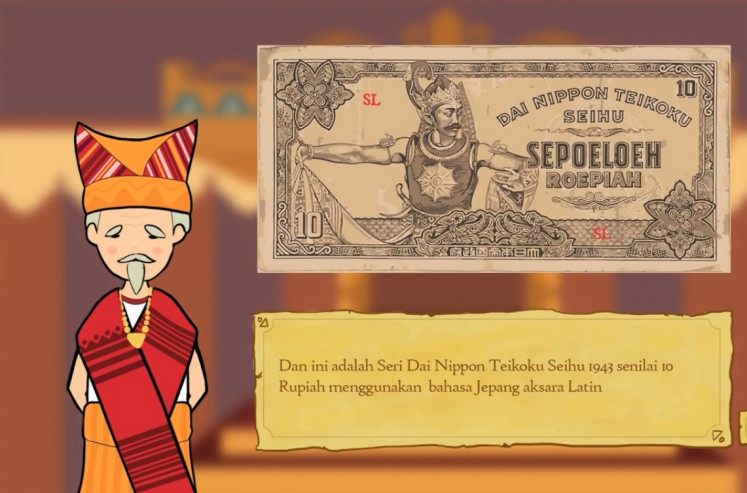Popular Reads
Top Results
Can't find what you're looking for?
View all search resultsPopular Reads
Top Results
Can't find what you're looking for?
View all search resultsDigital hack: Goethe festival uses tech to innovate culture
Festival Retas Budaya by Goethe-Institut offers a glimpse into the (digital) future of GLAM institutions.
Change text size
Gift Premium Articles
to Anyone
G
alleries, libraries, archives and museums (GLAM institutions) are often seen as repositories of human civilization and culture, both past and present.
Visiting one in person can sometimes require substantial effort, however. Perhaps GLAM institutions are concentrated in a large metropolis, or the entry ticket is a tad too high when combined with transportation costs; not to mention that the pandemic has closed most nonessential venues and placed restrictions on movement.
On the other hand, the pandemic has also prompted many of these institutions to adapt and improvise. Virtual tours and walkarounds have replaced physical ones, while seminars have become webinars that are streamed into visitors’ homes.
Goethe-Institut’s Hack Your Culture Festival – or Festival Retas Budaya (Cultural Hack Festival) in its Indonesian incarnation – is a timely event that captures the essential dilemma of the present: What happens when culture meets technology?
Historical fiction: In the Stories From Data category, contestants create short stories inspired by cultural collections. (Courtesy of Goethe-Institut Indonesien/-)In his prerecorded opening speech, Stefan Dreyer, the Goethe-Institut regional director for Southeast Asia, Australia and New Zealand, highlighted the impacts of the pandemic on cultural institutions. In particular, he pointed to how many of them remained closed while the public were largely confined to cyberspace.
“The question remains and becomes even more pressing: How can we expand this digital space so that it is also a place where we can experience culture? A space where culture is accessible to everyone,” said Dreyer.
“And that is exactly why we are here now during this festival. We are here to take a step forward towards open GLAM, to make cultural heritage, knowledge and practices accessible online.”
Streamed exclusively online on the Goethe-Institut Indonesien YouTube channel, the festival was free and open to all participants, though it required registering on a first come, first served basis.
It featured a seminar, discussions and workshops themed around the role of technology and open cultural data at GLAM institutions, and ranged from creating games entirely from data to a workshop on making digital collages.
Festival Retas Budaya was a collaborative project that involved Indonesia’s Culture Directorate General, Wikimedia Indonesia, the Indonesian Gaming Association (AGI), PT Elex Media Komputindo and the Indonesian Institute of Sciences (LIPI).
While the festival proper comprised mainly discussions and workshops, also included in the program were a number of presentations by participants of a series of pre-event contests.
These contests challenged participants to “hack” open cultural data and transform them into entirely new creations in four categories: Stories from Data, short stories inspired by cultural collections; Games from Data, developing games using cultural data; Open Design Remix, transforming archived images into new artwork; and Citizen Science & Open Data, which offered public participation in scientific research by contributing their own documentation on cultural data.
Of particular note was Games from Data, which intersected fun and learning. While edutainment games for school-aged children were par for the course, adults could also enjoy games presenting storylines and mechanics based on cultural data.
CEO Adam Ardisasmita of games developer Arsanesia and AGI vice chairman, noted the importance and documentation of cultural data. But if the data were not transformed into other mediums, they might not take off in popular culture, he said.
He cited Assassin’s Creed by Ubisoft as an example of the successful use of cultural data. Each installment of the video game franchise is set in different eras and locations, from the Third Crusade to the Italian Renaissance and to the American Revolution.
History made fun: Pre-event contests of Goethe-Institut Indonesien's Festival Retas Budaya (Cultural Hack Festival) pitched a challenge for participants to transform cultural data into new mediums, like this still from the 'Oeang Soeltan' video game. (Courtesy of Goethe-Institut Indonesien/Padarotan)As the franchise heavily featured cultural data in its settings, said Adam, gamers of younger generations formed a contemporary association with historical cultures and no longer thought of them as old or outdated, something their parents or grandparents might enjoy.
“If we want to talk about the extremes in [video] games documenting culture, when the Notre Dame cathedral caught fire [in April 2019], Ubisoft’s Assassin’s Creed: Unity has a 3D rendering of the Notre Dame that is so detailed, it could actually help in the reconstruction process,” he said.
As for Indonesia, Adam highlighted the archipelago’s cultural diversity as a unique selling point in a market oversaturated with the usual tropes, like cowboys and samurai.
“We can get on the global stage bringing something new and different, like when DreadOut brought into the spotlight [horror] creatures like pocong in a market filled with vampires and zombies,” he said.
“This is something that should be supported by the government and also the public, so that more local game developers will highlight our culture for a global audience.”
Alberth Reza Breitner, the cultural data systems subcoordinator at the Culture Directorate General, stressed the utmost importance of uploading GLAM institutions’ cultural data to the cloud, especially in the context of the mobility restrictions during the pandemic.
“A UNESCO report found that 90 percent of 94,418 museums in 195 countries have closed, so it is of very urgent significance,” said Reza.
“Some of the problems stated in the report are also alarming, like how only five percent of museums in Africa offer online services,” he added.
“The point is that cultural content is very much a priority for opening [up], especially during this pandemic. If not, related activities may well ground to a halt and that transfer of knowledge cannot happen.” (ste)













